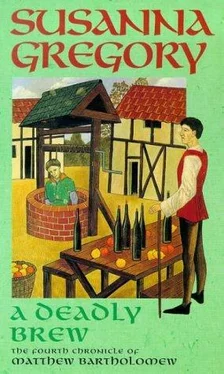Susanna Gregory - A Deadly Brew
Здесь есть возможность читать онлайн «Susanna Gregory - A Deadly Brew» весь текст электронной книги совершенно бесплатно (целиком полную версию без сокращений). В некоторых случаях можно слушать аудио, скачать через торрент в формате fb2 и присутствует краткое содержание. Год выпуска: 2013, Жанр: Исторический детектив, на английском языке. Описание произведения, (предисловие) а так же отзывы посетителей доступны на портале библиотеки ЛибКат.
- Название:A Deadly Brew
- Автор:
- Жанр:
- Год:2013
- ISBN:нет данных
- Рейтинг книги:5 / 5. Голосов: 1
-
Избранное:Добавить в избранное
- Отзывы:
-
Ваша оценка:
- 100
- 1
- 2
- 3
- 4
- 5
A Deadly Brew: краткое содержание, описание и аннотация
Предлагаем к чтению аннотацию, описание, краткое содержание или предисловие (зависит от того, что написал сам автор книги «A Deadly Brew»). Если вы не нашли необходимую информацию о книге — напишите в комментариях, мы постараемся отыскать её.
A Deadly Brew — читать онлайн бесплатно полную книгу (весь текст) целиком
Ниже представлен текст книги, разбитый по страницам. Система сохранения места последней прочитанной страницы, позволяет с удобством читать онлайн бесплатно книгу «A Deadly Brew», без необходимости каждый раз заново искать на чём Вы остановились. Поставьте закладку, и сможете в любой момент перейти на страницу, на которой закончили чтение.
Интервал:
Закладка:
‘Bingham will have a hard task controlling this new College of his,’ yelled Michael, putting his sweaty face near Bartholomew’s to make himself heard over the racket. Bartholomew nodded vigorously. ‘I wonder what those two are plotting.’ Michael pointed to where the Sheriff and the Mayor sat, their heads bent together confidentially as they conversed in what seemed to be furtive whispers.
Bartholomew liked Sheriff Tulyet, a small, wiry man with a wispy fair beard and a tolerance towards the University usually absent in town officials. Tulyet saw them looking at him and raised a hand in affable acknowledgement. Even from a distance, the Sheriff looked tired and strained, and there were rings of exhaustion under his pale blue eyes. Tulyet’s position was not an easy one to hold. His garrison had been sadly depleted by the plague and it was difficult to recruit replacements when crime was by far more lucrative. Since Christmas, a band of outlaws had settled in the area, using little-known causeways and canals in the Fens to make their escape after robbing travellers on the roads, disappearing as completely and cleanly as the marsh mists in sunlight long before Tulyet’s men could catch them.
Bartholomew smiled a greeting to him, and looked around the hall. Sheriff Tulyet and the Mayor were not the only ones to be taking advantage of the installation festivities to conduct a little business. Bartholomew’s brother-in-law, Sir Oswald Stanmore, was engaged in an animated discussion with the Master of Gonville Hall, while Bartholomew’s sister was abandoned to entertain the morose Prior of Barnwell on her other side. The University was one of the Stanmore’s biggest customers, and he was clearly embarking on some deal or other with the Master of one of its most powerful Colleges.
At the high table at the far end of the hall, Vice-Chancellor Harling, the University’s second in command, sat between the Countess of Pembroke and a handsome woman in her middle years whom Michael had identified as the Abbess of nearby Denny Abbey, a rich community of Franciscan nuns. Harling’s jet-black hair glistened greasily in the candlelight as he inclined his head politely towards the Countess, giving every appearance of listening with rapt attention to what she was saying.
‘Why is Harling in the seat of honour?’ asked Bartholomew of Runham, who sat opposite him, speaking loudly to make himself heard over the discordant singing from the gallery and the roar of drunken voices. ‘Where is the Chancellor?’
Runham pursed his lips to indicate his disapproval. ‘With the Bishop in Ely. It is a mere seventeen miles so I do not know why Chancellor Tynkell could not have made the effort to be here. An installation is, after all, an important University occasion.’
‘Perhaps his business at Ely is more urgent than gossiping with the Countess of Pembroke and the Abbess of Denny,’ said Bartholomew.
A servant slapped a dish of sugared almonds so hard in front of him, that some of them bounced across the table to be claimed by Michael. When Bartholomew glanced up at him, the man gave a cheerful wink, and his red cheeks suggested that the guests were not the only ones to have availed themselves of Valence Marie’s endless supplies of wine.
‘Tynkell is probably too afraid to come back,’ said Runham uncharitably. ‘He knows he is not up to the task of being Chancellor and is hiding away in Ely behind the Bishop’s skirts.’
The post of Chancellor was not a position Bartholomew would have willingly held. While it granted the holder a degree of authority over the University and the town, it was also fraught with political pitfalls. The previous incumbent had held office for four years, but the constant intrigues and crafty plotting had finally worn him down, and he had retreated to his family home in the Fens in poor health.
Harling, his Vice-Chancellor, had expected to step into his shoes as was the usual practice, but in an election that had astonished many scholars almost as much as Harling, a timid nonentity called William Tynkell — who had only agreed to stand for election because he thought it might raise the profile of his hostel in the University community — had won the majority of votes. Bartholomew might have questioned the honesty of the vote-counters, had it not been for the expression of abject horror on Tynkell’s face when he was declared the winner. Harling had accepted his defeat with dignity, and had volunteered to continue as Vice-Chancellor, an offer that Tynkell had accepted gratefully, openly acknowledging his inexperience in the treacherous world of University politics.
‘Tynkell!’ muttered Runham in disgust. ‘What a dreadful choice to be the leader of our University! All I can say is that I did not vote for him.’ He gazed speculatively at Bartholomew.
‘Neither did I,’ said Bartholomew, not wanting to be blamed for the Chancellor’s absence.
Runham nodded, satisfied, and went on. ‘I am not a man to risk my good health by bathing, but I am always careful to scent my clothes with lavender, and leave my clean linen on the shelf in the latrine to kill the lice. But Tynkell does neither, and there is an odour about him I find most unpleasant.’
‘I always feel itchy after an audience with him,’ boomed Father William, whose Franciscan habit was one of the filthiest garments in Christendom, and who paid scant attention to his own personal cleanliness. To prove his point, he began to scratch, and Bartholomew was amused to see Runham and then Michael follow suit. A few moments later, Alcote started, and then Master Kenyngham. It continued until Kenyngham — somewhat out of the blue — changed the subject by asking if anyone had ever debated the question ‘Let us consider whether the edge of the universe can be touched’ and, as the discussion grew more heated, the itches were forgotten.
Listening to his colleagues with half an ear, Bartholomew watched Harling and the Countess, who, judging from the flapping of her hands, seemed to be telling him how to fly. The Vice-Chancellor reached out a beringed hand, took up his wine goblet, and drained it without taking his eyes off the Countess’s face. Immediately, a servant hurried to refill it, and a few moments later the entire process was repeated. Bartholomew had heard that, despite her generosity — and resulting popularity — the Countess was not a lady renowned for conversational sparkle. He suspected Harling knew he had a long night ahead of him, and was preparing himself by dulling his mind with as much of Valence Marie’s wine as he could stow away without losing consciousness. Perhaps Chancellor Tynkell had been wiser than all of them, with his timely absence from the town.
Harling was given a brief respite from the Countess’s monologue as Sheriff Tulyet stepped forward to make his excuses for leaving early to the august occupants at the high table. Under his cloak, he already wore a mail tunic and boiled leather leggings, in anticipation of a nocturnal foray in search of the elusive outlaws.
‘Poor Harling,’ said Michael, watching as the Countess homed in on the Vice-Chancellor again as Tulyet left. ‘I am reliably informed that the noble Marie de Valence is about as interesting a companion as stagnant ditchwater.’
‘At least stagnant ditchwater does not hog the conversation,’ bawled Runham, who had won the debate about the edge of the universe simply because he had a good deal more to say about it than anyone else. He leaned towards the monk, the flowing sleeve of his fine ceremonial gown knocking over Bartholomew’s wine, and lowered his voice a fraction. ‘She has but two interests: breeding dogs and gardening.’
‘She is a very generous woman,’ Bartholomew pointed out. ‘She founded this College and the abbey at Denny, and she gives alms to the poor.’
Читать дальшеИнтервал:
Закладка:
Похожие книги на «A Deadly Brew»
Представляем Вашему вниманию похожие книги на «A Deadly Brew» списком для выбора. Мы отобрали схожую по названию и смыслу литературу в надежде предоставить читателям больше вариантов отыскать новые, интересные, ещё непрочитанные произведения.
Обсуждение, отзывы о книге «A Deadly Brew» и просто собственные мнения читателей. Оставьте ваши комментарии, напишите, что Вы думаете о произведении, его смысле или главных героях. Укажите что конкретно понравилось, а что нет, и почему Вы так считаете.












